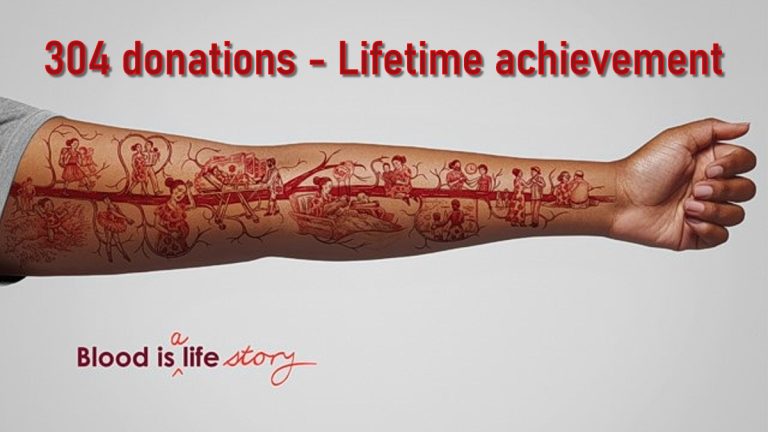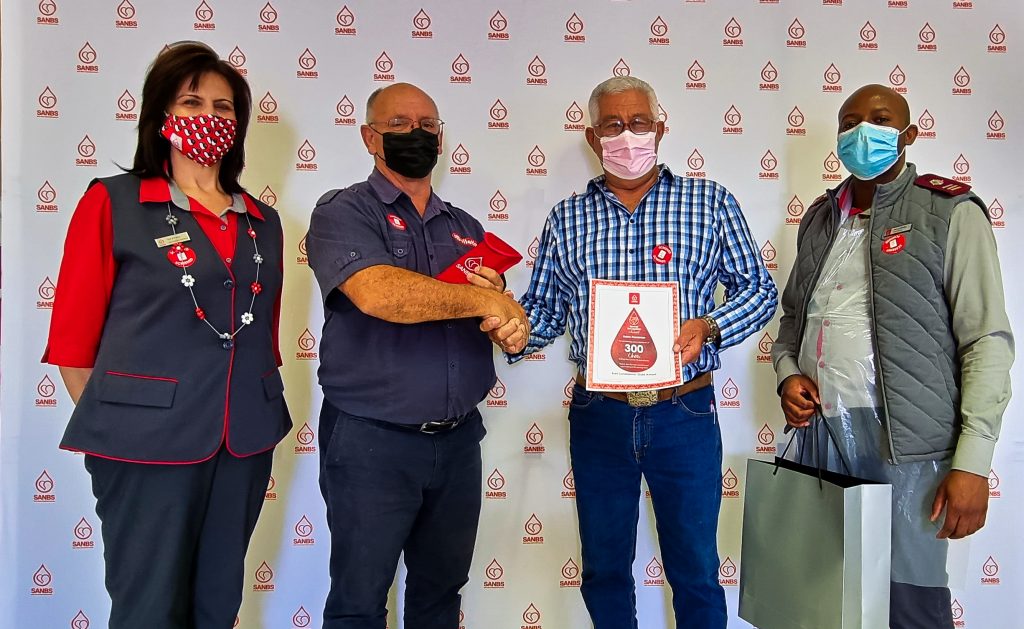
Anton Froneman achieved a lifetime milstone recently.
304 donations, that was the figure achieved by Anton Froneman on Tuesday 30 November when he donated blood.
This figure is not easily achieved and is indicative of years of dedication to the South African National Blood Service.

Blood donations can only be made every 56 days and to achieve 304 donations means that you never really missed any donations.
Anton started when he was very young. “I cannot remember exactly at what age I started,” said Anton, “but it was when I started working. I was about sixteen.”
“Glass bottles were used,” continued Anton, “I donated most of the 304 units here in this area.”
“I can still remember that we donated in Trichardt in the large church hall.”
Anton worked in the north of the country for about three years from 2010 where he struggled to donate blood.
“I always feel better and happy after I have donated,” said Anton, “I have never passed out after a donation and only started bleeding once.”
Anton served on the donor committee and served as vice-chairperson of the donor committee. He retired only recently from the committee but continue to be dedicated to donating blood.
Only a handful of people reach the milestone of 300 donations.
Here is a little about SANBS as taken from their website.
SANBS is a not-for-profit organisation; therefore, ownership of its assets does not vest in its members. In the event that SANBS should stop operating, its assets would have to be transferred to an organisation with similar goals and objectives.
SANBS provides an essential service within South Africa and is rated amongst the best in the world in the provision of blood and blood products, as well as in relation to the research and training provided.
SANBS operates across all of South Africa, with the exclusion of the Western Cape.
SANBS is further regarded as a major role player in the provision of support to countries in the SADC region.
Also read: ANIMALS 101 – HOT WEATHER AND YOUR PETS
Who can donate?
The universal access to safe blood is the lifeline for the healthcare system of any nation. As South Africans, we can all be proud of our dedicated and selfless voluntary donors who regularly donate blood to save the lives of thousands of our people every year.
Minimum Requirements to be a Blood Donor:
- You are between the ages of 16 and 75 years old, for first time donors.
- You weigh a minimum of 50 kgs (and platelets a minimum of 55 kgs)
- You are in good health.
- You lead a low-risk lifestyle.
- You consider your blood safe for transfusion.
- You have had a balanced meal within four hours of donating blood.
- You have not donated blood in the last 56 days (and platelets in the last 14 days.)
- Your pulse is between 50-100 regular beats per minute.
- Your blood pressure is below 180 systolic (first number) and below 100 diastolic (second number) (180/100mmHg) and above 100 systolic (first number) and above 60 diastolic (second number) (100/60mmHg).
- Your haemoglobin level is 12.5 g/dL or above.
Our screening test ensures that your blood pressure and haemoglobin levels are within a safe range for you to donate.

Please ask for more information if:
- You have had surgery in the last 6 months or are due for an operation within the next 6 weeks.
- You are pregnant or breastfeeding your baby.
- You are on medication such as antibiotics
- You are from, or have travelled to, a malaria area.
- You have had cancer, heart disease, epilepsy, a bleeding disorder or any other chronic medical condition.
- You are involved in a “hazardous” occupation or sport e.g. operating heavy machinery, flying a plane, scuba diving, working at heights etc.
If you are deferred please note that we do so in the best interest of your health as well as the safety of the blood being donated.
What is high-risk exposure?
- Having sex with, or working as, a commercial sex worker.
- Having sex with multiple sexual partners.
- Having sex with someone who has multiple sexual partners.
- Injecting yourself with drugs or being injected by someone other than your doctor or health care worker.
- Having sex with a sex worker or anyone taking money, goods, or favours in exchange for sex.
Please refrain from donating blood if:
- You have tested positive for HIV.
- There is any chance that you may have been exposed to HIV/ AIDS; or if you are donating blood only to be tested for HIV/AIDS.
- You are being treated for a sexually transmitted infection (STI).
Why so many questions if you test the blood?
Every infectious disease has a window period.
The “window period” is the time from when someone becomes infected to the time our tests are able to detect such an infection. When a person is infected with HIV or other viruses, the virus remains undetectable for some time in the blood. Although a person’s test result would be negative during this time, the virus is present in the blood and can be passed on to a patient through a blood transfusion.
This is why we ask people who may have been involved in risky behaviour to refrain from donating for a specific period after a high-risk exposure.
If, after you have donated, you have doubts about the safety of your blood, please contact your donor centre, call our toll free number 0800 119 031 or send an email to customerservice@sanbs.org.za
SANBS strives to ensure a safe and sufficient blood supply and all our procedures are in place in order to achieve this goal. This assures that our blood is amongst the safest in the world, something we are very proud of.

Plasma Donation
Become a Plasma donor:
We would like to invite you to become a plasma donor
What is plasma?
Plasma is the liquid part of your blood in which red cells, white cells and platelets are suspended. It carries these components throughout the body and makes up about 55% of your total blood volume. Plasma also contains antibodies, clotting factors and proteins such as albumin and fibrinogen.
You donate a bit of plasma when you make a normal whole blood donation, but you can also donate plasma only. This is done through a process called plasmapheresis or source plasma donation where plasma is separated and collected while the red cells, white cells and platelets are returned to your body.
Why donate plasma?
Plasma is essential to saving lives. Clotting factors, antibodies and proteins in plasma can be isolated and concentrated into various essential medicinal products used to treat people with rare, acute or chronic diseases and disorders such as haemophilia, Factor VII deficiency, Factor XIII deficiency, Antithrombin III deficiency, Protein C deficiency, von Willebrand factor deficiency, Fibrinogen deficiency, hereditary angioedema, primary immunodeficiency, genetic lung diseases, severe burns, trauma and shock.
“People with these conditions can live long and productive lives because of these treatments”
For more information on plasma products please visit the website:
http://www.nbisa.org.za/index.php/products/30-products/90-pharmaceuticals
Who should donate plasma?
Although anyone who meets normal donation criteria can donate plasma, we specifically need blood group A and AB donors aged 18 to 65 years to consider donating this special source plasma.
In addition, SANBS would like to invite you to donate source plasma, even if you…….
- have travelled to or come from a Malaria area
- are on anti-platelet medication such as aspirin and anti-inflammatories
Why blood group AB?
Blood group AB plasma is in high demand. The reason for this is that group AB plasma is universal; therefore it can be used by anyone regardless of their blood group.
What is the process of donating plasma?
You will undergo the normal screening process for blood donation which includes completing the donor questionnaire, having a one-on-one interview with a SANBS staff member and a mini-medical which includes blood pressure, pulse, haemoglobin and weight assessment. Once accepted, a high-tech machine is used to safely and quickly collect your plasma. A sterile needle is placed in the vein of your arm and blood is collected using sterile equipment.
The machine separates some of your plasma from the rest of the blood components. The plasma is collected into a bag. The other components of the blood such as red blood cells, platelets and white blood cells are returned to your body. The plasma collection set is disposable and is used only once. At the end of the procedure, some saline (sterile saltwater) is infused into your blood to compensate for the around 650 ml of plasma collected. The duration of the whole process is about an hour.
Is plasma donation safe?
Donating plasma is generally safe, however, side effects can occur. Most side effects are mild and include dehydration, lightheadedness, fatigue, discomfort or bruising at the site of needle insertion.
During the process of plasma donation, an anticoagulant is infused into the blood in the plasma machine before the blood is returned to your body. The anticoagulant is meant to prevent the formation of blood clots. Most of the anticoagulant is retained in the plasma but a small amount will enter your bloodstream. In some individuals, this causes what is called a citrate reaction.
This can present as a tingling sensation on lips and or mouth or a metallic taste. If severe it can lead to muscle twitches, numbness, rapid or slow pulse. Citrate reaction is treated with calcium available at the donation centre. In some rare cases, plasma donation can lead to more serious side effects such as nerve injury, irregular pulse, and shortness of breath or cardiac arrest.
How often can I donate plasma?
You can donate plasma every two weeks to a maximum of 24 times a year.
Where can I donate plasma?
Please speak to your local blood donation center or contact our toll-free number (0800 119 031) to find out where you can donate plasma today.
What about whole blood donation?
Whole blood donations are still vital. Whole blood is used to transfuse people involved in trauma and for the management of general medical conditions. Blood group O and B donors should ideally donate whole blood as there is a high demand for whole blood from these groups. Blood group A and AB donors who cannot donate plasma or platelets are more than welcome to donate whole blood. We invite you to find a donation center near you.